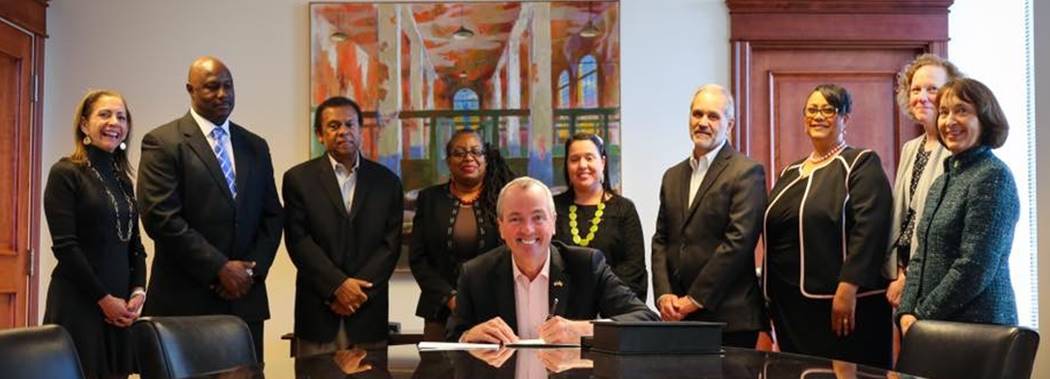
Statement from Ironbound Community Corporation, New Jersey Environmental Justice Alliance, Clean Water Action, and South Ward Environmental Alliance
Environmental Justice (EJ) communities throughout New Jersey are on the brink of change as the landmark Environmental Justice Bill S232 comes closer to being realized. Today’s release of long awaited rules that accompany this landmark EJ Law is a critically important milestone.
The law and now proposed rules tackle the decades-long pattern of dumping polluting facilities in communities Of Color and low-income communities. Under these new rules, polluting facilities will be required to undergo a robust environmental justice review before being permitted in overburdened, i.e., environmental justice communities. These precedent-setting rules will arm New Jersey regulators with the right to deny further harmful pollution in these neighborhoods.
Environmental justice communities will finally have a chance to have what many people take for granted - clean air and a safer environment in which to thrive. The just released rules would not have been possible without the tireless efforts of New Jersey environmental justice advocates and organizations, as well as State Senator Singleton, State Senator Ruiz, Assemblyman McKeon, Governor Murphy, NJ Department of Environmental Protection (NJEP) Commissioner LaTourette and staff that led to the passage of the law (S232) in the first place.
This rule reflects two years of continued hard work, expertise and community knowledge of EJ advocates who worked alongside the NJDEP staff to develop a strong set of rules that reflect the ambition, significance and promise of the landmark EJ law. We are eager to see these rules adopted as written as soon as possible and finally put to use in the communities that have been sacrificed for far too long.
New Jersey Environmental Justice Alliance, Ironbound Community Corp. Environmental Justice, South Ward Environmental Alliance, and Clean Water Action will be making sure that communities understand and are engaged with the public hearings regarding the proposed regulations. Too often when a historic bill such as S232 is passed, people stop paying attention after the bill is signed. It is imperative that our communities stay engaged. Until the final rule adoption occurs later this year, we urge the NJDEP to act in the spirit of the law and as we continue to fight our current battles for environmental justice in New Jersey, including: a fourth fracked gas power plant proposed by Passaic Valley Sewerage Commission, threat of a sludge facility proposed, and waste facility expansions in Camden.
The draft rules require the NJDEP to evaluate the environmental and public health impacts of various polluting facilities on overburdened communities when reviewing specific types of permit applications. It lays out a process for assessing the burden that new facilities may pose to communities that are already overburdened and directs the state to deny those permits that contribute to the existing stressors in those census blocks. It requires additional reviews of existing facilities in overburdened communities that undergo a renewal or expansion process and can apply more stringent conditions to those existing facilities. It also offers a robust set of public participation processes for local input.
“This is an important first step to ensuring that communities Of Color and communities with low-income in New Jersey have a chance to attain the clean environment that other communities in the state enjoy.” - Nicky Sheats, Ph.D., Esq, NJEJA Trustee
“The South Ward community of Newark just wants to breathe clean air and enjoy their quality of life free from additional toxic facilities impacting the health of the neighborhood” - Kim Gaddy, Environmental Justice Director, Clean Water Action
“We are excited about reaching this pivotal moment in the trajectory of the EJ law. Environmental Justice communities will be paying specific attention to what warrants a compelling public interest, what does it mean to avoid harming the community and provisions around community engagement. We need to ensure that no industry green washes their way through EJ law. “ - Maria Lopez-Nunez, Ironbound Community Corp.
“These rules represent the hard work and diligence of EJ activists that have worked tirelessly alongside NJDEP to produce the strongest environmental justice law in the nation. Finally, there is a light at the end of this journey towards environmental justice for all.” - Ana Baptista, Ph.D., The New School University, NJEJA & ICC Trustee
"One of the most critical details of the Environmental Justice Law is the robust public process required of permitting facilities. For far too long some of the worst actors have lied or bought their way into the good graces of a few key people and claimed that their 'back room' deals were community engagement. Even now some communities expect polluting industries to operate in obscurity and without their input. That all ends with the implementation of the EJ Law." - Melissa Miles, Executive Director, New Jersey Environmental Justice Alliance (NJEJA)
A full copy of the proposal is available on the Department of Environmental Protection's webpage at: http://www.nj.gov/dep/rules/proposals/proposal-20220606a.pdf
##
Since our founding during the campaign to pass the landmark Clean Water Act in 1972, Clean Water Action has worked to win strong health and environmental protections by bringing issue expertise, solution-oriented thinking and people power to the table.